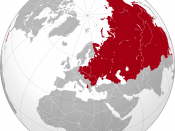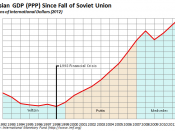The adoption of communist ideology in Russia in 1917 led to the collapse of the Soviet Union in 1991. On the other hand, china's experience with communism since 1949 does not seem to foretell the system's collapse. Why hadn't communism worked in Russia, whereas it hasn't apparently jeopardized in China's development? Write an analytical essay in which you account for Russia's failure and China's success.
Hint: everything you say must directly address the question and help shed light on it. Avoid information that has no bearing to the question.
Communism has arguably been the most important ideology of the twentieth century. In a way that perhaps only Nazism can match, it helped to shape the future of the post war world. The Cold War directly resulted from ideological tensions between communism and capitalism; the 1917 revolution in Russia had a huge impact on the peacemakers at Versailles and was a key factor in the resultant peace treaties.
Communist leaders claimed that they were 'building paradise' along the ideas outlined by Marx. Marx himself declared Communism to be the final stage of human progress. This would come about due to the inevitable collapse of capitalism because of its own internal contradictions. What was witnessed in Russia, China and elsewhere were said to be the first steps along the path of history that Marx had outlined. How far were Marxist predictions borne out in reality? To answer these questions consideration will be given to the nature of these communist regimes, pointing out the way in which these did or did not depart from the predictions that Marx had outlined. One of Marx's central predictions was that communism would occur in an advanced industrial state. . Yet communism in practice has not been witnessed in an advanced industrial society. The biggest communist experiment,


